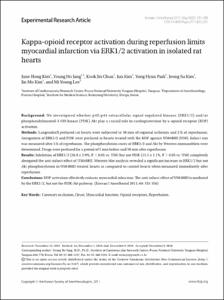KUMEL Repository
1. Journal Papers (연구논문)
1. School of Medicine (의과대학)
Dept. of Anesthesiology & Pain Medicine (마취통증의학)
Kappa-opioid receptor activation during reperfusion limits myocardial infarction via ERK1/2 activation in isolated rat hearts
- Keimyung Author(s)
- Kim, Jin Mo; Lee, Mi Young
- Department
- Dept. of Anesthesiology & Pain Medicine (마취통증의학)
Dept. of Preventive Medicine (예방의학)
Institute for Medical Science (의과학연구소)
- Journal Title
- Korean Journal of Anesthesiology
- Issued Date
- 2011
- Volume
- 60
- Issue
- 5
- Abstract
- Background: We investigated whether p42/p44 extracellular signal-regulated kinases (ERK1/2) and/or phosphatidylinositol-3-OH kinase (PI3K)-Akt play a crucial role in cardioprotection by κ-opioid receptor (KOP) activation. Methods: Langendorff perfused rat hearts were subjected to 30 min of regional ischemia and 2 h of reperfusion. Antagonists of ERK1/2 and PI3K were perfused in hearts treated with the KOP agonist U50488H (U50). Infarct size was measured after 2 h of reperfusion. The phosphorylation states of ERK1/2 and Akt by Western immunoblots were determined. Drugs were perfused for a period of 5 min before and 30 min after reperfusion. Results: Inhibition of ERK1/2 (26.8 ± 2.9%, P < 0.05 vs. U50) but not PI3K (15.5 ± 1.1%, P > 0.05 vs. U50) completely abrogated the anti-infarct effect of U50488H. Western blot analysis revealed a significant increase in ERK1/2 but not Akt phsophorylation in U50488H-treated hearts as compared to control hearts when measured immediately after reperfusion. Conclusions: KOP activation effectively reduces myocardial infarction. The anti-infarct effect of U50488H is mediated by the ERK1/2, but not the PI3K-Akt pathway.
- Publisher
- School of Medicine
- Citation
- June Hong Kim et al. (2011). Kappa-opioid receptor activation during reperfusion limits myocardial infarction via ERK1/2 activation in isolated rat hearts. Korean Journal of Anesthesiology, 60(5), 351–356. doi: 10.4097/kjae.2011.60.5.351
- Type
- Article
- ISSN
- 2005-6419
- 파일 목록
-
-
Download
 oak-aaa-03400.pdf
기타 데이터 / 202 kB / Adobe PDF
oak-aaa-03400.pdf
기타 데이터 / 202 kB / Adobe PDF
-
Items in Repository are protected by copyright, with all rights reserved, unless otherwise indicated.